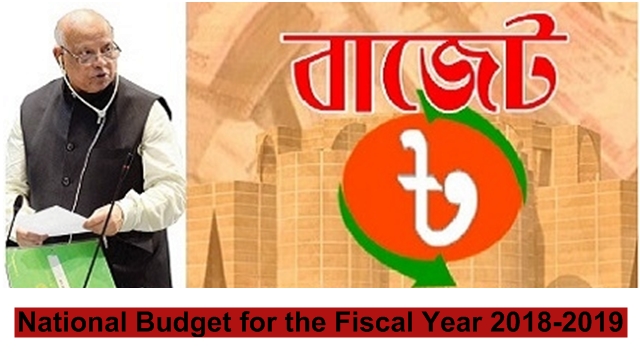Rubel Rana
Published:2018-06-07 15:54:08 BdST
‘No new tax’ as Muhith set to unveil budget Thursday
FT ONLINE
Finance minister Abul Maal Abdul Muhith is all set to announce today (Thursday) the last full national budget in Parliament before the end of the Awami League (AL) government’s two consecutive terms spanning a decade.
With the next national election expected to be held by the end of this year, the budget for FY2018-19 is likely to be worth Tk. 468,200 crore, which happens to be about 16 per cent higher than the last year’s proposed budget of Tk. 400,266 crore. However, Tk 127,000 crore will remain as deficit in the budget.
Economic observers have already dubbed this budget as “a whole bouquet for the country’s voting classes”. Sources from different quarters say that the government has already set a revenue target of Tk. 339,200 crore.
Information obtained from the finance ministry hints that the government is not going to increase income tax rates and instead would increase the slab of tax-free income ceilings.
Corporate tax rates are also likely to be slashed in keeping with the longstanding demand of businesspersons.
Finance Ministry sources said the corporate tax rate for banks is likely to be reduced to 37.5 per cent from 40 per cent.
Tax officials said a cut in the corporate tax rate would encourage banks to bring down their lending rates, thus opening new doors to private investors.
In case of value added tax (VAT) on goods and services, there would be five slabs, instead of the existing nine, but VAT rates would not be increased, said the officials.
Meanwhile, to publicise the incumbent government’s achievements, the new budget will focus on speeding up the implementation of several mega infrastructure projects, including the Padma Bridge, Rooppur Nuclear Power Plant and Metro Rail projects. As much as Tk. 32,555 crore has been set aside for these projects—this is around 19 per cent of the development budget.
Some other mega projects, such as the second Padma Bridge, Dhaka Underground Metro Rail and Circular Railway, have also been included in the Annual Development Programme (ADP).
To cater to the needs of the lower and lower middle class, the government plans to bring more people within the social safety net programme, without raising the allowance per person in most of the schemes. The number of beneficiaries, who would get allowances and food under the programme, will go up by around 10 lakh to 96 lakh in this year’s budget.
In the next fiscal, the government is set to allocate Tk 173,000 crore for the ADP, the highest in the history of the country compared to this fiscal’s Tk 153,000 crore.
Economists say that despite the poor performances of government agencies in implementing budgets over the last four years, the government has set ambitious targets in the new budget.
The budget implementation rate during the AL government’s tenure reached its peak with 87 per cent during the 2013–14 financial year. It has been estimated that the rate will fall to 74% in the outgoing fiscal year.
Experts say the low budget implementation rate is mostly the result of poor implementation of the ADP and the ambitious target of revenue mobilisation.
The National Board of Revenue (NBR) will collect Tk. 296,201 crore, which is around 32 per cent higher than the revised collection target in this fiscal year. This means around 90 per cent of the total revenue will be collected by the national exchequer.
Experts, however, say it is still unclear how the ambitious revenue target will be achieved as the NBR’s revenue growth rate was 18 per cent in the first 10 months of the new fiscal year.
Prof. Selim Raihan, teacher of economics at Dhaka University, told The Independent: “This is an election year. Naturally, there will be some reflection of the next national polls on the budget”.
“We need to be careful about unnecessary spending to make voters happy,” he added.
Raihan also said there are some guidelines for the preparation of a meaningful and implementable budget. “For example, the Seventh Five Year Plan will continue till 2020 and the SDGs till 2030. The forthcoming national budget need to be consistent with these guidelines.”
Raihan, who also is the executive director of the South Asian Network of Economic Modelling (SANEM), told The Independent that since Bangladesh is graduating from the LDC status, the country would face numerous challenges in the coming years. “There are risks of export loss in our major export markets, stricter adherence to many international agreements on tariff, subsidies and domestic support measures (especially under the WTO), and loss of preference in the pharmaceuticals sector (under the TRIPS waiver),” he said.
He also said that Bangladesh has been suffering from stagnation of private investment and slow growth of employment generation. “All national budgets for the next few years need to focus on these issues to help prepare the economy to face these challenges,” he added.
Unauthorized use or reproduction of The Finance Today content for commercial purposes is strictly prohibited.


